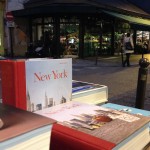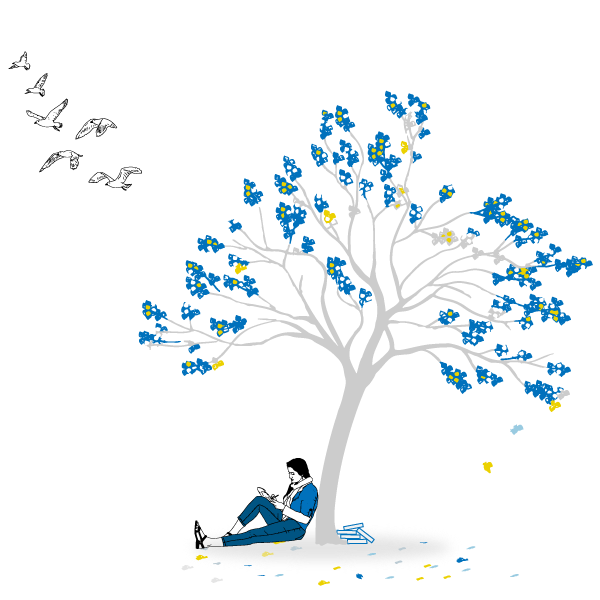“small diagnostic truths”
November 2, 2014.
Still Sundays.
“My plan was clear, concise, and reasonable, I think. For many years I have traveled in many parts of the world. In America I live in New York, or dip into Chicago or San Francisco. But New York is no more America than Paris is France or London is England. Thus I discovered that I did not know my own country. I, an American writer, writing about America, was working from memory, and the memory is at best a faulty, warpy reservoir. I had not heard the speech of America, smelled the grass and trees and sewage, seen its hills and water, its color and quality of light. I knew the changes only from books and newspapers. But more than this, I had not felt the country for twenty-five years. In short, I was writing of something I did not know about, and it seems to me that in a so-called writer this is criminal. My memories were distorted by twenty-five intervening years. […] So it was that I determined to look again, to try to rediscover this monster land. Otherwise, in writing, I could not tell the small diagnostic truths which are the foundations of the larger truth.”
The aforementioned passage is from John Steinbeck’s Travels With Charley: In Search of America. I happened to come by an 8th edition at an antique shop which I readily purchased. No regrets about that buy. On the contrary, several months prior to that, I bought—my curiosity had led me to get caught up in the Colbert-Amazon-Hachette controversy—California the debut novel by Edan Lepucki. It attempts at the dystopian genre which describes post-apocalyptic California. I was really hopeful to read something insightful. It didn’t take me very long to realize that the story read as if following a creative writing workshop formula. The characters were two-dimensional at best and the plot lacked the depth I was expecting. I read some reviews and they echoed my thoughts and feelings much more aptly than I cared to explore in writing a review myself. You can read two here: “Lepucki’s cautious dystopia never quite asks the right questions of us, ultimately to the detriment of the novel” and “mediocre characters plodding along in a meandering plot.”
I unsuccessfully tried to return my disappointment at the local Barnes and Noble. For months now it has been sitting on a small shelf where it is not visible. No one knows it is in this house but I know. I haven’t given it to recycling yet or donated it to a used bookstore. It sits there as a reminder about how not to write, how to contain your excitement about an “idea” as you work on the craft instead of just telling the idea as a story. More importantly, I think I have allowed it to fester in my space because I haven’t figured out my own reasons for disliking it so much other than the obvious ones in the reviews.
It was only this morning while reading that excerpt by Steinbeck that the profoundness of my dislike for that book became clear. A sentence formed to provide clarity: I am offended. Yes, that was the word! I was offended! I was offended by Lepucki’s treatment of the post-apocalyptic California (her attempt was to shed light on current California) because she failed to tell “small diagnostic truths which are the foundations of the larger truth.” And she failed to do so because, like many from California or those visiting here, have only been exposed to one version of California. California is a huge state that has endured many transitions and consists of so many middle-America towns that it can take a life-time “getting the story” right. Moreover, unlike New York City which the entire state of New York treats as a separate entity, here everyone carries on as if life begins/ends in one corner of the state in one prominent city and ends/begins in another well-known city. There is no delusion of “oneness” in New York City; New York City is that weird mole on the face of the state which just happens to belong there and there isn’t anything that can be done about it even if not all view it as a beauty mark. Austin is another example that comes to mind: it is an anomaly city. Even within anomalies there exist exceptions that originally make them an anomaly and without a deeper exploring, even if not physically, of the land itself, I think one would be hard pressed to write a story that offers “larger truths.”
Other than celebrating that clarity, I have been exploring “small diagnostic truths” this Sunday morning where the day offered an extra hour thanks to Day Light Savings Time. Things are certainly shifting. It is November! The Day of the Dead just passed and we should all be more concerned about the ghosts we may become than the ghosts that may haunt us.
2014 is almost over. What a year it has been. In many ways I have felt the entire year can be defined as if someone accidentally hit “freeze” in a game filled with more tricks than treats. This is not to imply lack of momentum but more akin to holding large blocks of ice and putting them in an order that doesn’t really exist. So you finally give up and the ice starts melting and you realize there was nothing to put together in the first place. Except the giving up required hitting an “unfreeze” and that was up to Time. So, it’s time. We only view it as end of the year because of the calendar we have created, for all we know November 1, 2014 might very well be the beginning of everything. It sure feels like it.
Another “small diagnostic truth” is the work I am doing in the field of literacy. I am beyond elated about putting together evidence in the form of a book. I didn’t know my first book would be a collection of stories and I didn’t expect my second one to be about students writing and third one to possibly be children’s fiction. I have considered starting a separate blog that pertains to education but a “small truth” of the matter is that all of that too is my life. I never imagined sitting and writing stories here or elsewhere in some ivory tower sipping on my tea and looking out the window at a world in which I didn’t participate. And so it is: all of my living which I choose to share belongs in this space, my cares about legal reforms and how they are shaping the American landscape to what is going on in the classrooms. After all, what good is writing if there are no adults who can read? I attended a recent conference where phenomenal educator, author, speaker, consultant, Kelly Gallagher, mentioned an article from the Washington Post, “Serious reading takes a hit from online scanning and skimming, researches say“. The author of Proust and the Squid calls this an “eye byte” culture. I feel compelled to share my findings that show if reading is taught by those who love to read, the current students who are in elementary schools, even English Language Learners, actually prefer to read print although they enjoy the digital world as a tool to extend their reading.
All these “small diagnostic truths” this year have led me to the foundations of a larger truth: the larger Universe opens up to us to the extent we let go of our reigns over our smaller universe.
“Bloom where planted” feels only glorious in theory and not in actuality because in reality you can’t always predict what blooms since it depends where you are planted. I don’t think the Universe would have it any other way.
“Soar, eat ether, see what has never been seen; depart, be lost, but climb.” ― Edna St. Vincent Millay


So much to learn from Steinbeck, right? That sentence you picked out about “small diagnostic truths” really encapsulates the whole point of close observation of people, places, and events, which is so necessary as the basis for illumination of life via fiction. Few could practice it as well as Steinbeck! Though I know he was rarely satisfied and clearly never complacent about it. How honest he was in his self-examination!–to see that he had lost touch over time with the details of the places he most loved to write about, and then commit to learning them all over again. I read a collection of his letters written while he was working on his translation of Le Mort d’Arthur, and they contain that same investigative spirit.
Of course, you have that spirit too! It is surely the basis of your drive to write. I like what you wrote about the many different Californias, and the importance of not taking one part of the experience of life there as a symbol for the whole of it. Good for readers to remember, as well as writers. Truths begin as specific truths, and general truths, when possible, are hard won and need to be approached cautiously.
I was also delighted to learn of your plans to devote new books of yours to discussing young students writing, from your experience of teaching them, and collecting children’s fiction works themselves. Very exciting and you are just the woman to do it! *Cheers!*